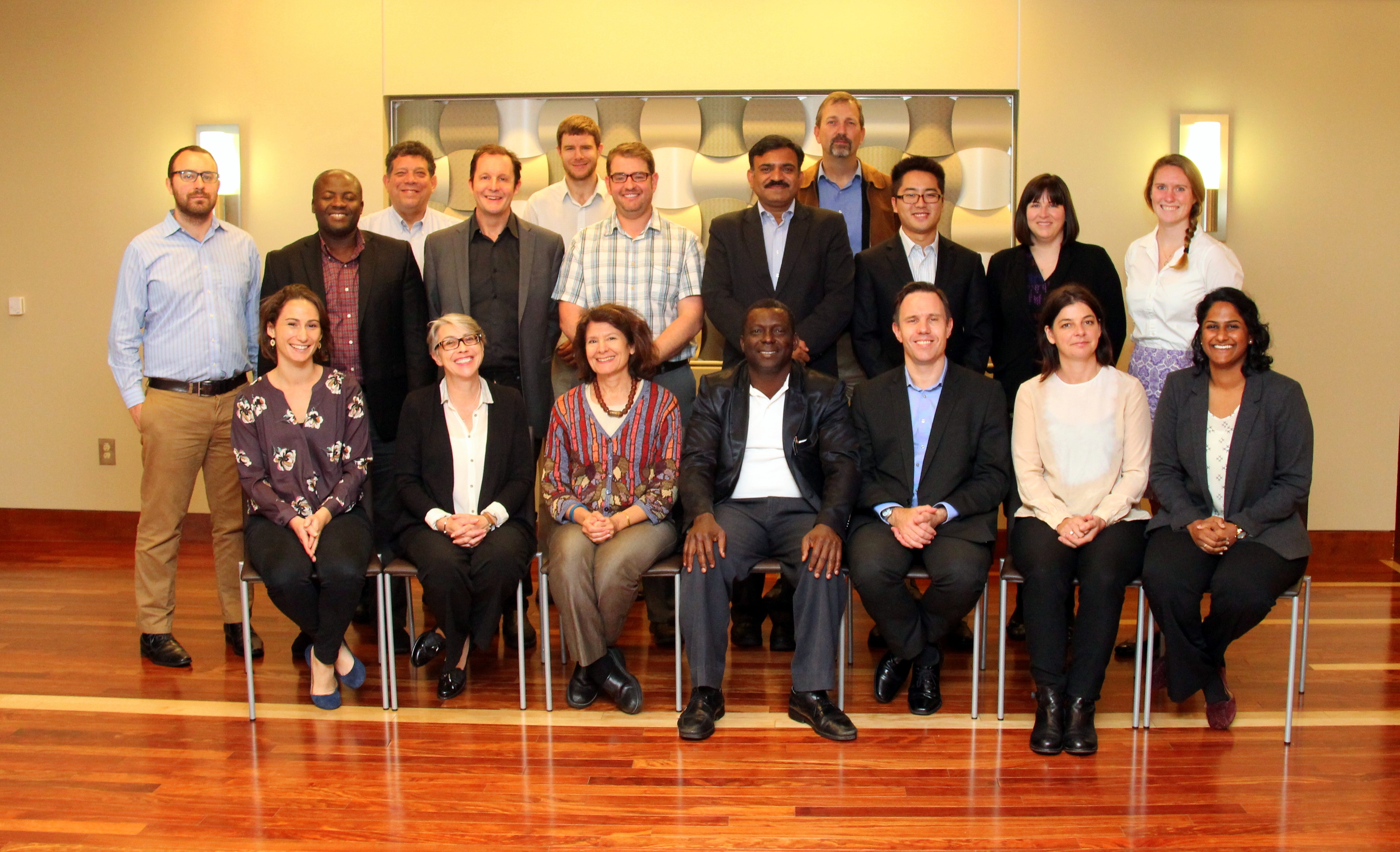Making Academic Research Useful for Practitioners
The SaniPath Tool has been developed through rigorous research by Dr. Christine Moe and her team at the Emory University’s Center for Global Safe Water, Sanitation, and Hygiene. However, to date, there has been limited application of the tool and use of the information gathered to inform investments and interventions aimed at improving sanitation. In order to improve the SaniPath Tool, the Emory team formed an Advisory Committee to seek input on how to effectively use the findings and recommendations from the SaniPath Tool to influence urban sanitation investments, policies, and programs to benefit the urban poor. The Advisory Committee is made up of leaders in the urban sanitation field from development banks, universities, and funding agencies as well as government programmers, practitioners, and policy makers.
Top Row: James Michiel (SaniPath), Habib Yakubu (SaniPath), Eddy Perez (SaniPath), Martin Gambrill (World Bank), David Berendes (SaniPath), Jesse Shapiro (USAID), ), Suresh Kumar Rohilla (Center for Science and Environment), Jan Willem Rosenboom (Bill & Melinda Gates Foundation), Andrew Wang (SaniPath), Amy Kirby (SaniPath), Jillian Cordes (SaniPath)
Bottom Row: Kate Robb (SaniPath), Amanda Marlin (Sanitation and Water for All), Christine Moe (SaniPath), Patrick Apoya (Africa Sanitation Think Tank), Neil Jeffery (Water and Sanitation for the Urban Poor), Kate Medlicott (World Health Organization), Suraja Raj (SaniPath)
The Advisory Committee congregated in Atlanta on November 17 and 18 and were asked to provide concrete suggestions for the following dilemmas:
- How to make the findings from the deployment of the SaniPath tool in a given city useful for strategic stakeholders to effectively influence policies, programs, and investments
- How the tool can be easily used and understood by other potential users of the tool
- How to scale up the use of the SaniPath tool by others
Overall, the Advisory Committee felt that the SaniPath Tool was useful in its ability to identify risk of exposure to fecal contamination based on frequency of contact with fecally-contaminated pathways in households and neighborhoods resulting from poor fecal sludge management. In a resource constrained world, the committee felt that the SaniPath approach provided solid and objective data for prioritizing public investments and interventions while also recognizing that policy decisions often reflect political and economic influences. A full report on the meeting is in progress, but key guidance from the Advisory Committee includes:
- Deployment of the tool at a level representative of the city as a whole and not just a few poorer urban slums
- Identification and capacity building of institutional partners that can use the SaniPath Tool without Emory support
- SaniPath practitioners spending more time during the preparation stage to better understand how decisions about investments and interventions are made and who makes them
- Communicating data and results from the deployment of the SaniPath Tool in a clearer non-technical manner to allow for better understanding by decision makers
- Developing a clearer description of the SaniPath Tool to distinguish it from other analytical tools currently available so that decision makers are not confused by the wide arrange of tools available
- Emory forging partnerships with on-the-ground organizations that are working directly with local governments to improve safe sanitation in the urban areas
- Developing field notes and case studies on how the SaniPath Tool was deployed, results used, and related lessons learned
There is remaining work to be done in order for the SaniPath tool to have an impact on sanitation for the urban poor, but this meeting was an excellent example of the value of bringing together practitioners to provide advice to researchers. Moving forward, the SaniPath team hopes to continue the dialogue with the Advisory Committee and use their suggestions to maximize the potential of the tool.
Eddy Perez is Professor of Practice at the Center for Global Safe WASH. Connect with Eddy on Twitter at @eddyperez1209




Sorry, the comment form is closed at this time.